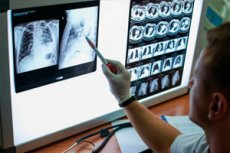Perioperative immune therapy improves survival in cancer patients lungs
Sist anmeldt: 14.06.2024

Alt iLive-innhold blir gjennomgått med medisin eller faktisk kontrollert for å sikre så mye faktuell nøyaktighet som mulig.
Vi har strenge retningslinjer for innkjøp og kun kobling til anerkjente medieområder, akademiske forskningsinstitusjoner og, når det er mulig, medisinsk peer-evaluerte studier. Merk at tallene i parenteser ([1], [2], etc.) er klikkbare koblinger til disse studiene.
Hvis du føler at noe av innholdet vårt er unøyaktig, utdatert eller ellers tvilsomt, velg det og trykk Ctrl + Enter.

Compared with preoperative (neoadjuvant) chemotherapy alone, the addition of perioperative immune therapy — before and after surgery — significantly improved event-free survival (EFS) in patients with resectable early non-small cell lung cancer (NSCLC), according to researchers at The University of Texas MD Anderson Cancer Center.
Results from the phase III CheckMate 77T trial were published in the New England Journal of Medicine. With a median follow-up of 25.4 months, the median EFS with chemotherapy alone was 18.4 months, while the median was not reached in patients receiving perioperative nivolumab, representing a significant prolongation of EFS compared with the control arm. These results correspond to a 42% reduction in the risk of disease progression, relapse, or death in those receiving the periperative combination.
These data were first presented at the 2023 European Society for Medical Oncology (ESMO) Congress.
Key Findings
Patients receiving the nivolumab-based periperative regimen also demonstrated significantly higher rates of pathological complete response (pCR), defined as no tumor at surgery, compared with those receiving chemotherapy alone (25.3% vs 4.7%).
Rates of major pathological response (MPR), defined as ≤10% viable tumor cells at surgery, were also higher in patients receiving periperative immune therapy (35.4% vs 3.5%). 12.1%).
Comments from Lead Investigators
"This study strengthens the standard of care for neoadjuvant chemoimmunotherapy and supports perioperative nivolumab as an effective approach to reducing the risk of lung cancer recurrence," said lead investigator Dr. Tina Cascone, associate professor of medical oncology, thorax/head and neck.
"These results add to the evidence that the perioperative immune therapy pathway gives patients with resectable lung cancer the opportunity to live longer without their cancer returning."
Approximately 30% of patients diagnosed with NSCLC have resectable disease, meaning their tumor can be removed with surgery. While many of these patients can potentially be cured with surgery, more than half of them experience cancer recurrence without additional therapy. Chemotherapy given before or after surgery provides only minimal survival benefit.
CheckMate 77T Study
The CheckMate 77T trial, a randomized, double-blind trial that began in 2019, included more than 450 patients with NSCLC over the age of 18 years from around the world. Participants were randomized to treatment with either neoadjuvant nivolumab plus chemotherapy followed by surgery and adjuvant nivolumab, or neoadjuvant chemotherapy and placebo followed by surgery and adjuvant placebo.
Safety and side effects
The data showed no new safety signals with perioperative nivolumab and are consistent with the known safety profiles of the individual agents. Treatment-related grade 3-4 adverse events were observed in 32% and 25% of patients receiving the periperative combination or control therapy, respectively. Surgery-related adverse events occurred in 12% of patients in both treatment groups.
These results complement the recent success of neoadjuvant nivolumab plus chemotherapy in NSCLC. In March 2022, the phase III CheckMate 816 trial led to FDA approval of nivolumab in combination with platinum-based chemotherapy.
"I'm excited about the initial results of the study," Cascone said. "In the future, it will be important to identify patient and disease characteristics that will tell us who could potentially be cured by neoadjuvant chemoimmunotherapy alone and who would benefit from more intensive treatment strategies."
